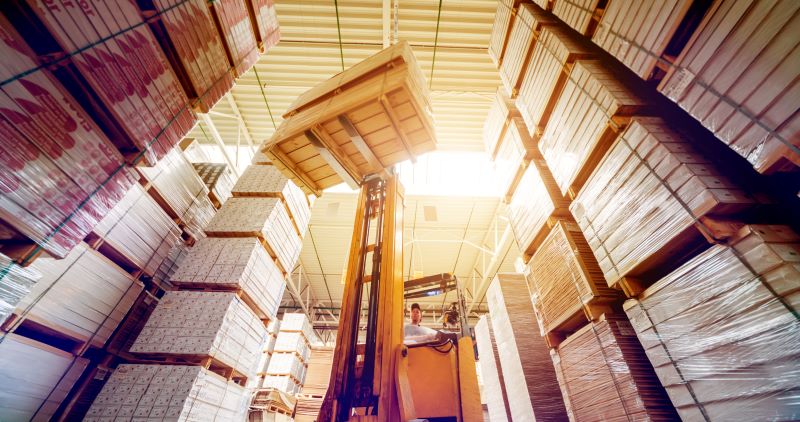Wholesale & Distributors Should Prepare for Change in 2020
Published on by Steve Bailey in Wholesale / Distribution

When the Federal Reserve (“the Fed”) dropped interest rates for the third time in a row this past October, the business world took notice. At the time, the Fed stated their rate drops were simply insurance against a recession and not indicators one was imminent. This move may have paid off. On December 11, 2019, Federal Reserve Chairman Jerome Powell revealed the Fed has no plans to adjust rates, leaving them in the 1.5% – 1.75% range for all of 2020. Many believe the Fed’s stance implies that markets are on an upswing. Although this move is promising, it’s not an endorsement of a budding economy, and wholesale and distribution companies may experience additional challenges in the new year.
Another Statistic to Consider
The Federal Reserve rate is not the only predictor of economic well-being. Changes in the yield curve can also be effective predictors of economic changes. In fact, changes in the yield curve have successfully predicted the five most recent recessions. Typically, a recession follows what is called a yield curve inversion.
The yield curve depicts interest rates that borrowers are willing to pay for bonds with different maturity rates. When the yield curve is “normal,” interest rates on long-term investments have higher interest rates than similar investments at shorter maturity rates. Under typical market conditions, borrowers consider long-term investments to be riskier than short-term investments and expect to be compensated for taking on that additional risk. When the yield curve inverts, borrowers are declaring that short-term bonds are the bigger gamble.
The yield curve had been inverted since March and only recently reverted to normal. A normal yield curve is a good sign, but it does not mean our economy is stable just yet. We may very well go through a recession before the economy can recover. Historically, inverted yield curves preceded recessions by an average of 14 months. Wholesale distributors need to prepare for a possible economic downturn.
Preparation Checklist
There are a few things wholesale and distributors can do to guard against a recession. If one occurs, they will be ready, and if we are lucky enough to squeak by this episode unscathed, they will be well ahead of their competition and operating more smoothly in the new year.
Explore eCommerce.
Wholesalers and distributors who have not yet ventured into the eCommerce world should put it at the top of the list. eCommerce platforms for wholesale are lagging where they should be, but they are improving each day, and vendors are making it easier to customize platforms to fit each company’s needs. A quality eCommerce platform allows companies to:
-
-
- Look at sales statistics in real time so they can pivot their strategies quickly and seamlessly
- Review historical data to understand trends and assess the success of promotions
- Evaluate buying trends to tweak customer segmentation
- Give customers the information they want to see like order history, pricing records, dispute resolutions, and customer service interactions
- Improve collectability of accounts with electronic invoicing
-
Adopt other new technologies.
Making sure you’re a digitally well-connected enterprise will take time and investment, but it will pay dividends if you do it right. A new enterprise resource planning (ERP) system, for example, can improve employee productivity, streamline manual processes, improve communication, and reduce product costs all at once. Some other new technologies to consider are new customer relationship management (CRM) software, electronic data interchange (EDI) systems, marketing automation platforms, warehouse management software (WMS), and updated finance and accounting software. Implementing new software can take months of hard work, so consult with a business advisor to come up with a plan that will not disrupt business.
Expand into new territories.
Expanding only into contiguous markets may have worked for your business in the past, but you may need to expand further to beat out the competition. Doing so manually may be difficult, which is why mergers and acquisitions continue to be popular in the wholesale/distribution industry. Companies are aggressively chasing after market share, and acquisitions can be the easiest way to capture those new customers quickly.
Consider outsourcing.
If you choose the right partners, outsourcing can save you time and energy that you can spend elsewhere in your business. Implementing Third-Party Logistics – 3PLs – may mean outsourcing your warehousing function, order fulfillment, or shipping. Your 3PL company can improve your efficiency in the long run, especially if you have no prior history in these operational areas. Consider outsourcing your marketing function, SEO and web analytics, back office support, or accounting.
Contact Us
Only time will tell if 2020 will bring a recession, but there’s no need to wait before preparing for the future. Improving workplace efficiencies can always be a goal, regardless of the economic forecast. If you would like to discuss the economic forecast or need assistance with an accounting, tax or audit issue, Barnes Dennig can help. For additional information please call us at 513.241.8313 or click here to contact us. We look forward to speaking with you soon.
